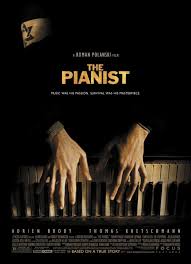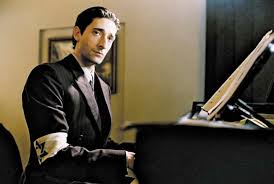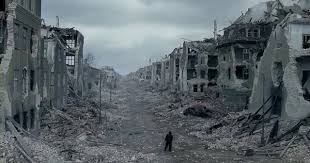Is there any genre of film that Hollywood (particularly AMPAS) loves more than the Holocaust film? There are a good number in existence, and its almost guaranteed that Oscar nominations will ensue. Of course, the most personal of these come from directors with some sort of connection to the Holocaust, whether by heritage and family or personal experience (though there are precious few of the latter). The Pianist, directed by Roman Polanski, falls into this latter, owing to his experiences of living in WWII Poland (though his parents were sent to concentration camps, he managed to escape the ghettos and wander about the country).





The Pianist is based on the memoirs of Wladyslaw Szpilman, a Polish Jewish pianist who is forced to survive the destruction of Warsaw during WWII. Adapted by Ronald Harwood (who won an Oscar for his screenplay), Szpilman's story feels authentic, free from Hollywood manipulation and preaching. In fact, with the exception of an admittedly-cathartic scene toward the end, the film doesn't make any attempts to preach from a pedestal about why the Holocaust was bad; this is great because, honestly, the history, the numbers, speak for themselves.
As Szpilman, Adrian Brody gives a mesmerizing, subdued performance. Brody has established himself as a more-selective Robert De Niro: an unconventionally-handsome leading man of considerable talent (hopefully, unlike De Niro and Jack Nicholson, he'll take less paycheck roles in the future, though his recent reinvention as an action hero is dubious). Its amazing how sublime his performance here is, since he has very few lines in the film; in fact, he's almost completely silent for most of the film's third act. Its a magnificent performance.
Brody
Before I go into Polanski's direction, I want to make something very clear: I do not approve of the fact that he had sex with a 13-year-old girl and then fled the country. I think it is abominable, and that he should serve time for his actions. However, I always make a point not to let someone's personal life influence my judgement of their works. For example, even though Woody Allen married ex-lover Mia Farrow's adoptive daughter (beyond icky), I still think of him as a great writer/director, just the same as Phil Spector's murder conviction doesn't diminish his Wall of Sound greatness; conversely, Sandra Bullock may be a fantastic person to be around, an all-around sweet and wholesome woman, but that doesn't mean that I think she's a great actress (certainly not an Oscar-winning one, but I've probably gone on about that one too much).
Polanski's direction in this movie is nothing short of phenomenal. The film is shot in a style that is naturalistic without being cinema verite, giving the film a very matter-of-fact mood in regards to its subject material. Polanski's trademark shots - shot from a character's point-of-view with focus on things that are important - are well-used, helping immerse the viewer into the events of the film while simultaneously keeping the viewer at a bit of a distance. Its almost as if Polanski is saying, "Try as you might, you'll never really understand what it was like to be there." But he comes very close to doing so. One particular scene comes to mind, in which Szpilman, on his own, escapes from German soldiers and climbs over the walls of the ghetto, landing in an almost-completely destroyed Warsaw that's more haunting than any destruction scene from a post-apocalyptic film.
The Pianist is a depressingly optimistic Holocaust film (as if there's any other kind), one that lets the viewer feel miserable for the atrocities that were committed against the Jews but also uplifts with Szpilman's own account of survival.
Comments